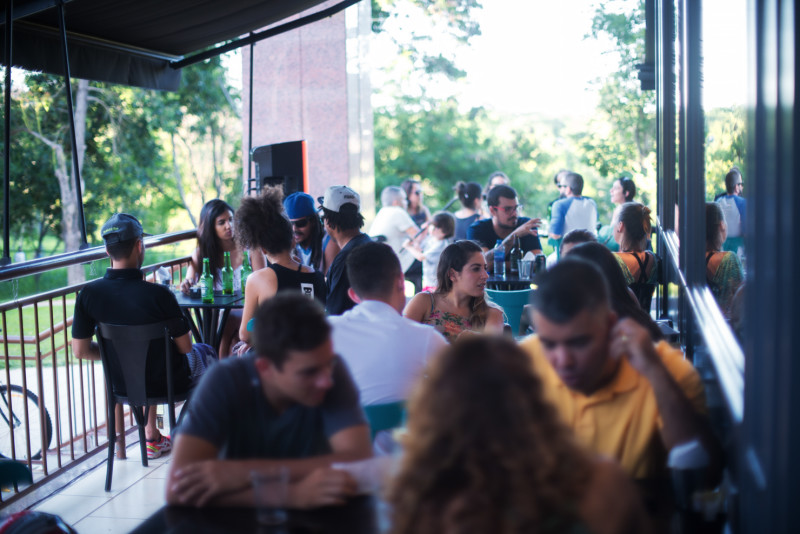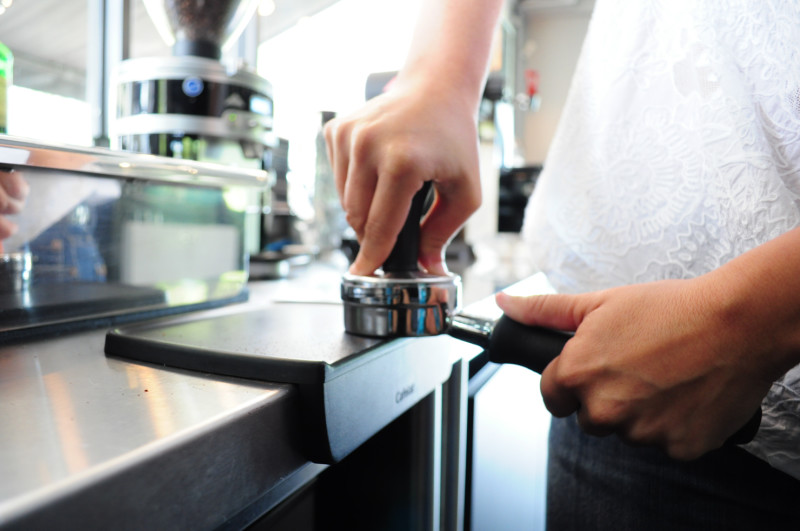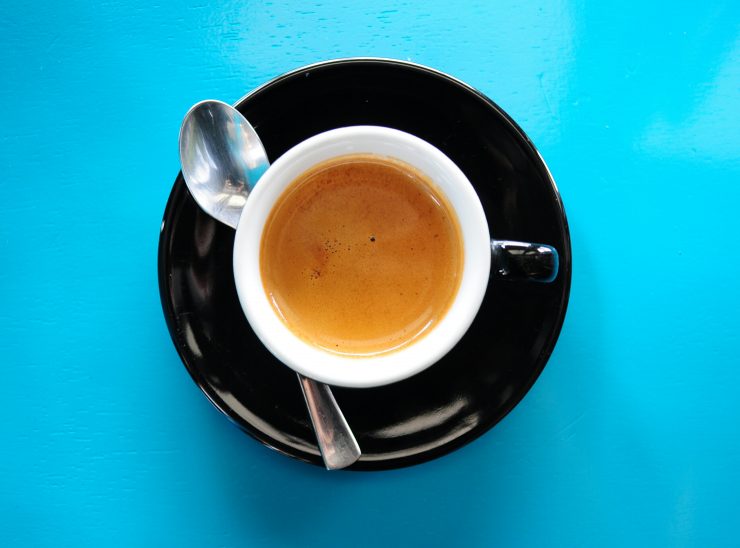
Rodrigo Balduino, Liana David, and Carolina Balduino founded Brasília’s Clandestino Café e Música in August 2014, but their plans for the cafe had been brewing for years. David and Carolina Balduino were partners at a restaurant here in Brazil’s capital city, but had begun taking coffee courses at Isabela Raposeiras Coffee Lab in São Paulo, with eyes to shifting gears towards coffee. Rodrigo Balduino, Carolina Balduino’s brother, had been living in Barcelona at the time, where he was thinking about creating a clandestine music event. When Rodrigo moved back to Brazil, the three Balduinos realized they could combine their visions. So began the idea of Clandestino Café e Música.
The three were inspired by Clarice Lispector’s tale “Felicidade Clandestina,” which translates to “undercover happiness,” and were able to quickly agree that the name of the cafe would be based on this sentiment. The style of the cafe evokes faraway Nordic coffee bars: very clean, sober, yet beautiful. The trio chose to place their coffee bar against a wall, so that it is in full view of the customers. David and Rodrigo Balduino explain that when they opened, they felt that Brasília did not have many customers who were well-informed about coffee, so they wanted to show them what a specialty coffee bar looks like first and foremost. And the cafe’s location could not be better. It is situated right in front of the Olhos D’Água Park, a beautiful green haven in the middle of Brasília’s North Wing.
Brazil’s Cerrado vegetation, typical of the midwest region, is preserved in the park, and one can still find remains of the area’s early rural life, such as fig, mango, and banana trees. David and Rodrigo Balduino later tell me that the 413 North (the block where Clandestino is located) is fast becoming a gastronomical hub, with many quality restaurants opening in the wake of Clandestino. Many customers stop in after they have had lunch nearby, eager for a good espresso. Students, too, from the University of Brasília stop in, as the campus is just a few minutes away.
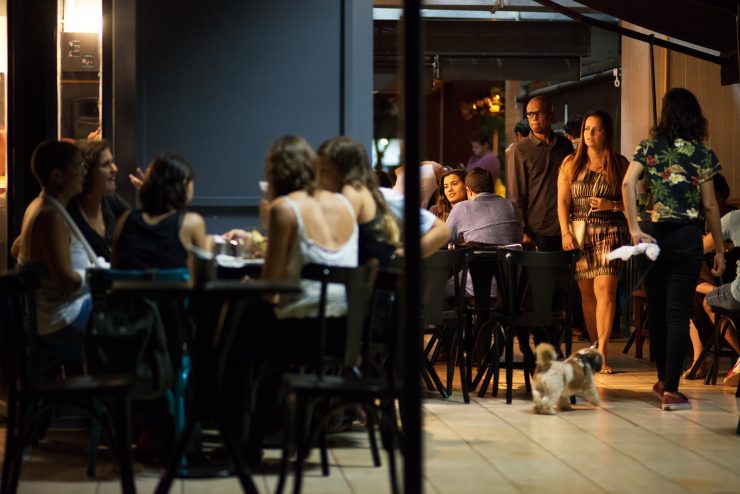
Music plays a fundamental role at Clandestino. Rodrigo Balduino curates the soundtrack played in the coffee bar, and thoughtfully produces the music events Clandestino is famous for. The instrumental jazz night, held every last Sunday of the month, is a hit among Brasílienses. David and Rodrigo Balduino tell me that the shop gets particularly busy during the evenings and weekends they feature live music alongside their coffee.
Carolina Balduino brings her culinary background to the short menu that holds sweet and savory treats, updating the offerings monthly in order to accommodate seasonal shifts. One of the most popular items is the Tapioca, which is manioc flour in the form of a pancake, filled with queijo coalho (a fermented cheese very typical in the northeast of Brazil) and cane molasses. Tapioca pairs flawlessly with filtered coffee and makes for a filling and delicious gluten-free breakfast. A sweeter selection is the Nougat Glacé, a French sweet made of dried fruits, which comes paired with an espresso served in a tiny shot glass.
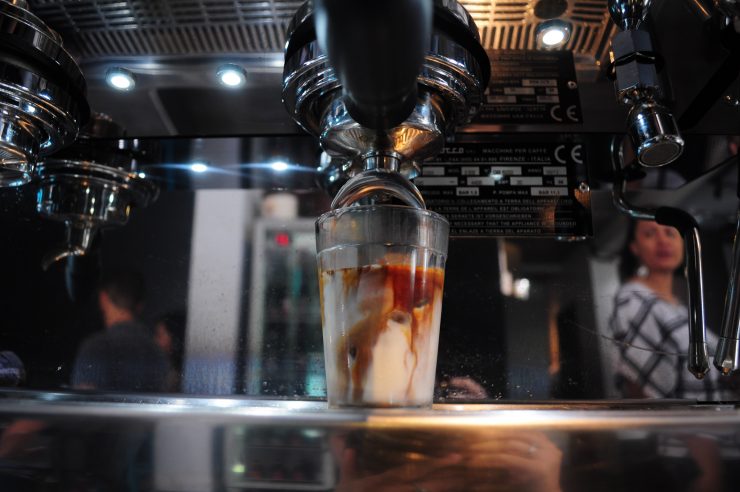
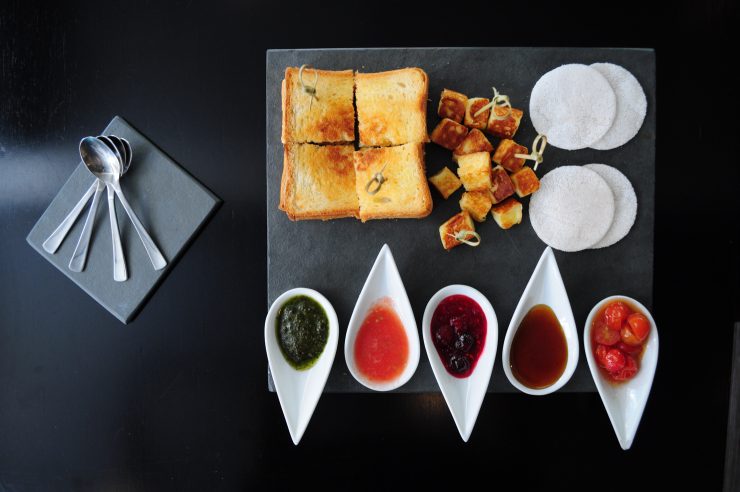
Clandestino is a multi-roaster coffee bar. When I visited, 4 Beans Coffee Company, Isso é Café, and Pereira Villela were available as pour-over coffees (Hario V60), as well as AeroPress and French press. These were all prepared by the barista at the table, in front of the client. The espresso, which comes in a glass demitasse with a piece of slate used as a saucer, varies depending on the roaster they are working with. Baristas are extensively trained and can practice up to four months before they start extracting espressos on the shop’s La Marzocco FB80. Newly converted customers can also find coffee tools available for sale there, and David or Rodrigo Balduino are on hand to help with instructions to brew at home.
David and Rodrigo Balduino enthusiastically tell me that lately, the shop hasn’t been able to keep up with the demand for whole-bean coffee. Customers sometimes call in advance asking them to hold newly arrived coffees so that they can come later to pick it up. The owners predict that Brasília will soon have a seasoned specialty coffee market, similar to Curitiba. They value the recent opening of other craft coffee shops in the area and assure me that the owners are all friends. Due to the fact that the city is located far from most Brazilian roasteries, the cafes in the region all, from time to time, face logistical issues with roasted coffee delivery. They are used to leaning on this network of friendly cafes when supplies are short, calling each other up and “borrowing” coffee, until the next lot arrives.
Clandestino is the place to go to get a break from Brasília’s politics, sip an espresso, and take in the beauty of the park—all to the sound of music as perfectly considered as the coffee and the setting.
Clandestino Café e Música is located at CLN 413, Bloco D, Brasília. Follow them on Facebook and Instagram.
Juliana Ganan is a Brazilian coffee professional and journalist. Read more Juliana Ganan on Sprudge. Photos courtesy of Tatiana Medeiros and Joao Vicente.
The post Clandestino Café e Música: A Nordic-Inspired Coffee Bar In Brasília appeared first on Sprudge.


